by Greg Thielmann
There has been a blizzard of commentaries in recent months on what U.S. policy should be in the face of North Korea’s defiant efforts to develop nuclear-tipped ballistic missiles. It is the habit of U.S. government officials to solemnly warn that “all options are on the table” for dealing with North Korea’s nuclear weapons, including a “preventive” first strike, which would disarm as much of the country’s nuclear weapons capabilities as possible. Yet there is almost complete silence on the illegality and immorality of any such attack and on how it would affect the long-term prospects for nonproliferation elsewhere.
As Peter Beinart astutely noted in The Atlantic, U.S. dalliance with the idea of preventive war in the 21st century is a radical departure from American tradition. In the 20th century, Americans associated “first strike” with Imperial Germany invading neutral Belgium in 1914, Nazi Germany and the Soviet Union invading Poland in 1939, and Imperial Japan attacking Pearl Harbor on December 7, 1941—“a day that will live in infamy.”
The taboo against preventive war was critically weakened by a doctrinal change of the George W. Bush administration, first announced in the president’s West Point speech in June 2002 as intended “to confront the worst threats before they emerge.” The theme was officially registered and elaborated upon in the National Security Strategy (NSS) document issued three months later—with the nation still caught in the emotional wake of the 9/11 attacks but increasingly turning its attention to Iraq.
Preemptive and Preventive
This dramatic reversal of U.S. doctrine was cleverly justified in public presentations through the use of two conceptual conflations, clearly visible in the fine print of the NSS:
- The new “preventive” attack doctrine (attacking to prevent another party from acquiring a future capability) was mislabeled a “preemptive” attack doctrine (taking action against an imminent attack). In this way, the Bush administration disguised the inherently illegal nature of the former with the potentially legal status of the latter.
- Rogue states and terrorist organizations were nonsensically treated as synonymous, even though each required completely different tactics to thwart. (History demonstrates that a rogue state dictator can be much more easily deterred than a suicide bomber.)
Moreover, the Bush administration justified the change by referring to the existential threat posed by nuclear weapons. The NSS declared: “The greater the threat, the greater is the risk of inaction— and the more compelling the case for taking anticipatory action to defend ourselves, even if uncertainty remains as to the time and place of the enemy’s attack.” President Bush made the public case more luridly: “We cannot wait for the final proof—the smoking gun—that could come in the form of a mushroom cloud.”
Under Two Bushes
In retrospect, the two U.S. invasions of Iraq within the space of a decade provide starkly contrasting bookends for the dramatic change in American thinking about preventive war, even as international opinion remained constant.
Saddam Hussein’s invasion and occupation of Kuwait in August 1990 led to a UN-authorized and U.S.-led coalition attack to restore Kuwait’s independence in January 1991. All major world powers condemned Iraq’s first strike in the form of UN Security Council Resolution 660, which called for Iraqi withdrawal. Subsequent UN resolutions called for members “to use all necessary mean to uphold and implement UNSC 660.” A vote of Congress explicitly authorized U.S. participation shortly before the beginning of the attack. One key fact that brought together an impressive coalition against Saddam was Iraq’s blatant violation of international law in initiating the use of force against its neighbor.
The United States sought to win UN Security Council support for the use of force against Saddam Hussein’s Iraq again in 2003, arguing that its planned invasion was simply the enforcement of UN Security Council Resolution 1441 in November of 2002. This resolution had been based on suspicions of nuclear proliferation by Iraq and Baghdad’s defiance of the terms of the 1991 ceasefire agreement. But following Iraq’s re-admittance of UN inspectors by the end of 2002 and on-going elimination of illicit missiles in early 2003, the United States failed in its efforts to secure a UN Security Council majority in support of an invasion, even failing to persuade NATO allies Germany and France. The executive chairman of the UN Monitoring, Verification and Inspection Commission, Hans Blix, advised that more time was needed to resolve remaining issues before military action could be justified.
UN Secretary General Kofi Annan subsequently judged the invasion as not “in conformity with the UN Charter.” The International Commission of Jurists, a standing group of 60 eminent jurists reflecting the geographical diversity of the world and its many legal systems, also concluded that the war was illegal. Even America’s staunch ally in the invasion subsequently had second thoughts. The UK’s official Iraq Inquiry found afterward that the legal basis for the law was questionable. UK Deputy Prime Minister at the time of the invasion, John Prescott, just acknowledged last year that he had come to believe the war was illegal.
Axis of Evil, Charter Member
Many echoes from past U.S. treatment of Iraq, that companion member of the “axis of evil,” can be heard in America’s current discussion of how to deal with North Korea. When American pundits now declare that time is running out, they are generally referring to the day when Kim Jong Un can credibly threaten the American mainland with nuclear-tipped missiles.
In spite of the loose language and incoherence displayed by the Trump administration over the last four months, some elements of a rough consensus on Korea policy seems to be emerging. The administration obviously appreciates the seriousness of the issue, bemoaning the failure of past agreements with Pyongyang and the inability of sanctions alone to halt North Korean advances. There are indications that some in the administration realize that a freeze in nuclear and missile testing might be achievable in the near/mid-term future, but this outcome would require a willingness to engage diplomatically and to seek compromises.
Most experts, in government and out, acknowledge that military measures to take down North Korea’s nuclear and missile systems would likely provoke a bloody response, leading to grievous consequences for South Korea and its allies, including the United States. What is lacking in nearly all commentaries is a willingness to explicitly rule out-of-bounds a “preventive” U.S. first strike against North Korea.
Keeping open the option of attacking North Korea first will do more than anything else to firm up Pyongyang’s resolve to keep and expand its nascent nuclear forces to discourage that very scenario. Moreover, it will increase the cynicism abroad about American hypocrisy regarding the rules for resolving international conflict and deepen frustration over stalled action between the United States and Russia in meeting their disarmament commitments under the nuclear Non-Proliferation Treaty.
It is time to return to the traditional American abhorrence of those who attack other countries first. Remember the admonition of U.S. Supreme Court Justice Robert H. Jackson at the Nuremberg Tribunal: “We are not prepared to lay down a rule of criminal conduct against others which we would not be willing to have invoked against us.”
Photo: North Korean leader Kim Jong Un
Greg Thielmann is a 25-year veteran of the U.S. Foreign Service, including two tours in the State Department’s Bureau of Intelligence and Research. He subsequently worked as a senior staffer on the Senate Intelligence Committee and a senior fellow of the Arms Control Association.

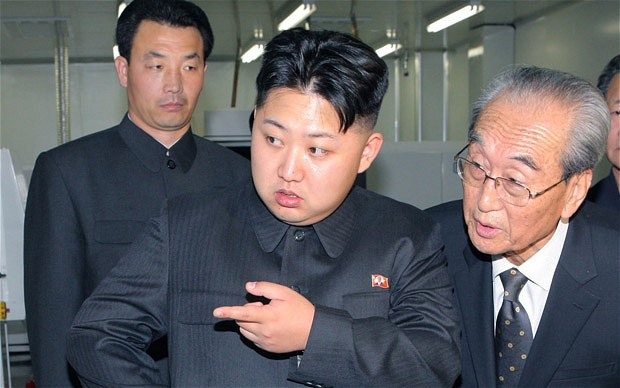
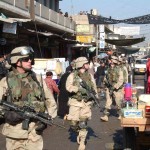
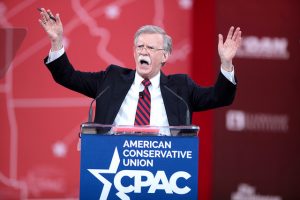
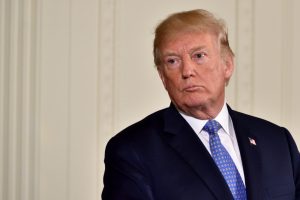
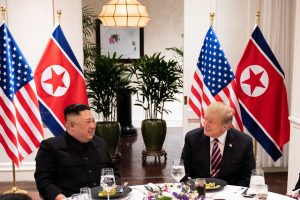
Dwight D. Eisenhower, The President’s News Conference
(August 11, 1954).